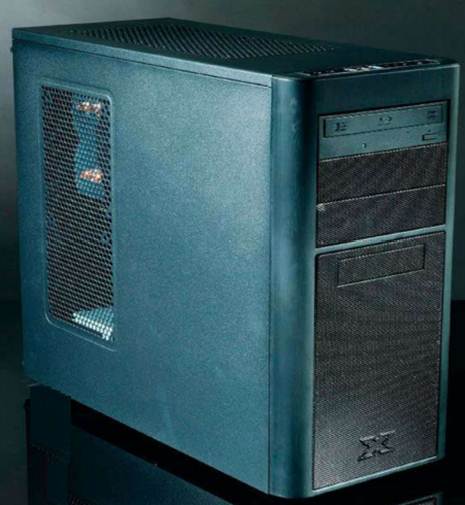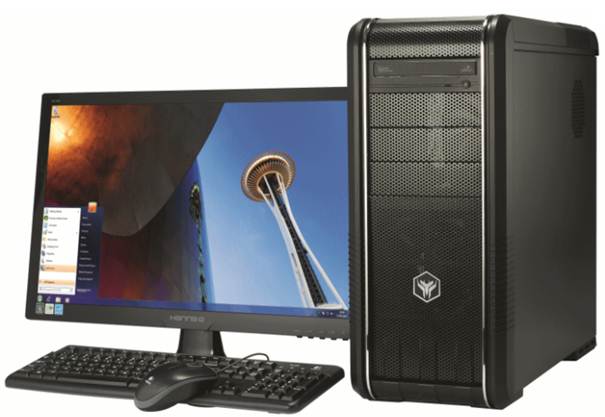Super test: Wired2Fire Diablo GTX

The safe money option seems to be a combo
of the Intel i5-3570K, clocked up somewhere around 4.6GHz, with a GTX 670 and a
120 GB SSD. This Wired2Fire machine looks to be hitting a similar spec to the
excellent PC Specialist rig though with half as much RAM and a much quicker
SSD.
To be perfectly honest, dropping the RAM
count down won’t make a blind bit of difference to your experience with this
rig unless you’re the sort of person who spends a lot of time tweaking massive
image files in Photoshop on their home rig. Even then, 8GB is a pretty sizeable
chunk of RAM to be playing with. In term of gaming the difference is negligible
to the point of being inconsequential.
The SSD though us a different matter. The
Mushkin Chronos Enhanced drive seems to be one speedy ol’ solid state drive,
especially in terms of the 4K random writes, which are almost twice as quick as
the Intel 330’s in the PC Specialist rig. In sequential read/write terms though
it’s not quite so quick. Those 4K scores though should give you a good idea of
just how responsive your PC would offset any perceivable issues caused by
dropping the RAM capacity.
With the smart choice of using the GTX 670
as graphics card the Diablo GTX has got some impressive gaming chops, and will
throw polygons around a 1080p panel with aplomb. Compared with the excellent
overclocked HD 7970 of the AdvanceTec rig though it’s still looking like a bit
of a slouch – but aside from the heavily compute-focused DiRT Showdown you’d be
hard pushed to see the extra performance when you’re actually in-game.
Under
cover
Wired2Fire doesn’t have a bad standard
warranty. The Vibox and YOYOTech offerings of just a single year of parts and
labour cover are the weakest, with Scan’s three-year cover being the best.
Wired2Fire offers a two-year return-to-base warranty, with cover for both parts
and labour for the full term. That’s almost up there with the Chillblast cover.
That gives great peace of mind when you’re
choosing your components, and means that your overclocked machine will still be
going a couple years down the line. You will have to sort out getting the rig
back to the manufacture if something goes wrong, but that’s a small price to
pay if it’s something serious.
That might come in handy, because the rig
has been set up so that the i5 is running at a constant 4.6GHz rather than
throttling up only when needed. The large cooler should stop that becoming a
problem, but it still seems odd not to take advantage of the power saving
functions of the Intel architecture.
Again though, it’s a very well balanced
setup, marrying impressive gaming speed with decent raw processing chops and a
general computing setup that will give you a very responsive experience. It’s
also a machine that will last you a long time, giving you a decent length of
time before you’re going to need to start realistically thinking about which
parts you upgrade.
|
Vital statistics
|
|
Price:
|
$1,500
|
|
Manufacturer:
|
Wired3Fire
|
|
Web:
|
www.wired2fire.co.uk
|
|
CPU:
|
Intel Core i5-3570K @4.6GHz
|
|
Motherboard:
|
Asus P8Z77-VLX
|
|
Memory:
|
8GB Corsair Vengeance
|
|
Graphics:
|
MSI GTX 670
|
|
SSD:
|
120GB Mushkin Chronos Enhanced
|
|
HDD:
|
1TB Seagate
|
|
PCFormat Verdict
|
4.5/5
|
|
Features:
|
4.5/5
|
|
Performance:
|
4.5/5
|
|
Value:
|
4.5/5
|
|
Another well balanced machine that only
just loses out to the PC Specialist rig in terms of RAM and clockspeed.
|
|
|
|
Super test: YOYOTech Fi7epower PCF

Not convinced by the necessity of low
capacity solid-state storage? Then YOYOTech‘s latest Fi7epower machine might
well be the right rig for you. Like the Vibox Boss XS, it has thrown its full
weight behind the performance of the processor and graphics card, rather than
the more ephemeral positives of running the machine from an SDD boot drive.
With the Core i7-3770K, arguably the finest
processor that Intel has made in recent memory, doing all the raw processing
shenanigans at the heart of the budget-oriented Asus motherboard it’s right up
there at the top of the CPU performance free. It’s not the quickest due to a
slightly speedier overclock from Vibox, but at 4.5GHz compared to the 4.6GHz of
the Boss XS, it’s a close run thing, and still makes the Fi7epower a lot
quicker than the competing i5-based rigs.
It’s not just the top Intel CPU that’s
churning away in the Cooler Master 690 chassis-the graphics card is pretty
quick too. YOYOTech has opted for the top of Nvidia’s desktop range of Kepler
cards, the GTX 680. Like the Vibox GPU it’s just the stock-clocked version, so
there is a little in the way of extra space available if you want to try the
overclocking dance yourself.
Cost-cutting
That said, the overclocked GTX 670 that’s
responsible for the graphical grunt work for the Chillblast machine gives
practically the same benchmark scores across the board, and saving some cash on
the GPU would have meant it could have added a small caching SSD to speed up
that Western Digital hard drive.
But that hard drive isn’t quite the
limiting factor that it was with the Boss XS. It’s a full SATA 6Gbps drive, and
that means it boots in half the time of the slower SATA 3Gbps Seagate drive
used in the Vibox machine. If YOYOTech could trade the GTX 680 for a GTX 670
and a 60GB SSD, the Smart Response caching tech –conspicuous by its absence
from the Dino PC build-would be available to knock that boot time right down
again. The AdvanceTec rig shows just how quick a cached HDD can be on boot,
ably keeping pace with the speedy SSDs used by the bulk of the other rigs in
this group test.
Having that eight-threaded monster of a CPU
inside the machine means that it will cope with anything computing related you
throw at it. If you split your time between gaming and anything productivity
related, you’ll be glad of those extra threads. There is a simple, short
upgrade path too. Simply adding in a decent capacity SSD will give you a really
top-notch rig, and with prices crashing in the solid-state market it’s cheaper
than ever to do so. Replacing a CPU or GPU is going to be a lot pricier.
Its’ the faster HDD and more stylish, if
last generation (there are no front-mounted USB 3.0 ports, for example) CM 690
chassis that give the Fi7epower the edge over the similarly specced Vibox
machine. They both have a rather paltry one-year return-to-base warranty,
though the lack of a solid state drive here isn’t the killer you might think it
would be.
|
Vital statistics
|
|
Price:
|
$1,500
|
|
Manufacturer:
|
YOYOTech
|
|
Web:
|
www.yoyotech.co.uk
|
|
CPU:
|
Intel Core i7-3770K
|
|
Motherboard:
|
Asus P8Z77-VLX
|
|
Memory:
|
8GB Kingston HyperX
|
|
Graphics:
|
Nvidia GTX 680
|
|
SSD: None
|
|
|
HDD:
|
1TB WD Blue
|
|
PCFormat Verdict
|
4/5
|
|
Features:
|
3.5/5
|
|
Performance:
|
4.5/5
|
|
Value:
|
4.5/5
|
|
For pure performance the YOYOTech can’t
be beaten, but a weak warranty and lack of an SSD hold it back.
|